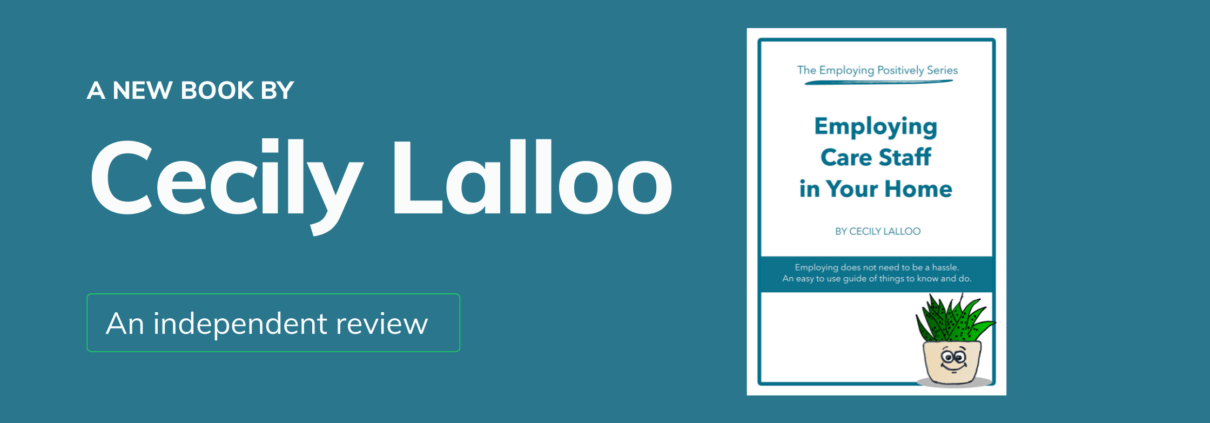Employing people in your home does not need to be a hassle if you know how! Read this independent review of Cecily Lalloo’s new book guiding you through the things to know and do…
Book Review
For most of us, having to employ care staff for us or our families at home is not something we expect to do. It’s not something we are prepared for.
And because when we do have to do this, it will often come at a traumatic time – after a major illness or accident when the last thing we will want to think about is employment law and tackling red tape – we need help to come in a simple and digestible form.
That’s why Cecily Lalloo’s book will be a real godsend to families in this situation. Written in plain terms, it offers guidance and support for people who find themselves being the employer in their own home. Cecily herself has a wealth of expertise in HR and the care sector, so you can tell that the advice you’re getting is really valuable.
She takes things from the very beginning, explaining the types of employment, and different scenarios that you may find yourself in.
Working through step by step, the book makes it so easy to follow the whole employment cycle. Cecily explains in plain terms how to find the right person – she discusses considering both their attitude and their skillset, whether they will be employed on a permanent or casual basis, and how to advertise and keep within discrimination laws.
There are some interview questions you can use and at-a-glance top tips.
What I love about this book is the simple way it is laid out. There are useful checklists that make it easy to see at a glance what you need to do. Really useful when you are busy and stressed – the last thing you need is help that is complicated and convoluted! The case studies also help to put everything into a real-world perspective.
The same style is used throughout the book. Cecily explains how to make a job offer (not something most of us have ever had to do, I’m sure), and her advice makes it seem straightforward. Again, a checklist of what to include in the contract is laid out for you.
Cecily then goes on to explain what should be expected of a working relationship, how to deal with breaks, holidays and time off – even things such as maternity and parental leave. It is explained in such a straightforward and matter-of-fact way that it doesn’t seem at all daunting.
Of course, there may be problems along the way – and again, Cecily explains how to handle having to dismiss an employee, along with their resignation, redundancy or retirement.
Having someone working for you in your own home, especially under what can be stressful conditions, is not easy for many people, but with this book, Cecily gives ordinary families the tools to handle far more than they may ever have imagined. There may be times when you need an HR expert, and she highlights these throughout the book, but overall it is a guide that no family planning on hiring a carer should be without.
The ebook is available at: https://bit.ly/3pLNWpm
“I wanted to say I have read your book and it is brilliant. I found it easy to follow, informative and helpful for my role.” – Case Manager
Cecily’s Response
“I was so thrilled to receive this wonderful independent review of my new book – the first in my Employing Positively series. This one is particularly special to me – as it is aimed at helping families who are already going through a traumatic time: Employing Care Staff in Your Home.
“I am also hoping it will help me achieve another goal of mine – I plan to set up a sensory room for children with brain injury in my home country of Zimbabwe, so for each book sold, £1 will go towards that cause”
If you would like to discuss the book further, please contact Cecily Lalloo at Embrace HR Limited.
T: 01296 761288 or contact us here.
If you would like to receive our newsletter, please sign up here.
Based in Aylesbury, Buckinghamshire, Embrace HR Limited provide a specialised HR service to the care sector, from recruitment through to exit.










